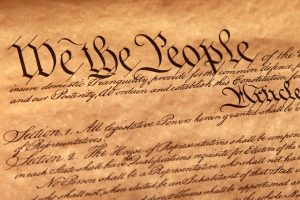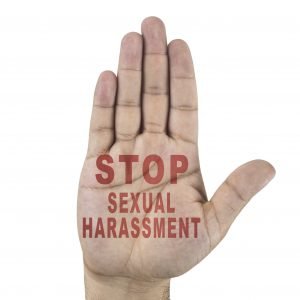This past week I had the wonderful opportunity to interview Jim Oleske, a Professor of Law at Lewis & Clark. Professor Oleske is an expert on the First Amendment’s free exercise clause. A couple years ago, he wrote a prescient law view article that has made him something of a legal prophet (pun intended) in my mind. Below is our conversation about the free exercise doctrine generally and discussion on an important free exercise case heard by the Supreme Court this term. Enjoy!
Tyler Broker: In 2019, you wrote a law review article titled Free Exercise (Dis)Honesty? that identifies past and current dishonesties when it comes to free exercise cases. Can you explain how the Supreme Court has been dishonest in its approach to free exercise cases?
Jim Oleske: The central dishonesty is this: Over the past six decades, the court has disingenuously pretended to be faithfully applying precedent as it has repeatedly changed its position on the issue of whether there is a constitutional right to religious exemptions from neutral laws. The first flip came in 1963, when Justice Brennan led the Court to recognize a right to religious exemptions while wholly ignoring the teaching of prior cases that recognition of such a right would “permit every citizen to become a law unto himself.” The second flip came in 1990, when Justice Scalia led the court to repudiate a right to religious exemptions while implausibly claiming that such a right had never been recognized by the court. In fact, just one year earlier, Scalia himself cited four cases decided in the Brennan exemption era which, in Scalia’s own words, “held the Free Exercise Clause of the First Amendment required religious beliefs to be accommodated by granting religion-specific exemptions from otherwise applicable laws.”
Today, the court appears to be headed back to the pro-exemption position, and it has been granting religious exemptions to COVID restrictions without any serious effort to reconcile its orders with the Scalia era decisions of Employment Division v. Smith and City of Boerne v. Flores. Those decisions read the free exercise clause as only protecting against government targeting of religion, and the court sternly lectured Congress in City of Boerne that it could not purport to enforce free exercise rights by requiring exemptions from state laws “without regard to whether they ha[ve] the object of stifling or punishing free exercise.” But that is exactly what the court itself did in the two most recent COVID cases, South Bay II and Gateway City Church. A group of church-state scholars pointed out this inconsistency to the court in an amicus brief filed in the latter case, but the court granted an exemption anyway, offering no reasoning beyond a reference to its earlier decision in South Bay II, which in turn offered no majority opinion.
TB: In the law review article, you predicted (accurately) that the court was working toward overruling Employment Division v. Smith. Just two years later there is a case this very term, Fulton v. City of Philadelphia, where one of the issues presented is whether Smith “should be revisited.” Before we get into Fulton, however, I want to address the fact that many, including myself, would argue Smith has already been effectively overruled by the court’s recent “shadow docket” pandemic restriction cases. In these cases, the court seemed to abandon the reasoning used in Smith and adopt the “most favored nation theory.” Can you explain what the “most favored nation theory” is and whether you agree Smith has already been overruled?
JO: As a result of the COVID cases, there are now two very different versions of the most favored nation theory of religious exemptions. The original version, most closely identified with Professor Douglas Laycock, posits that even if a law generally applies to both religiously and nonreligiously motivated activity, a religious exemption must be granted if (1) the law contains so much as a single other exemption that is deemed “comparable” to the requested religious exemption, and (2) the government cannot justify the denial of the religious exemption under strict scrutiny. The revised version, articulated by Justice Kavanaugh in the COVID cases, removes the comparability trigger (“That threshold question does not require judges to decide whether a church is more akin to a factory or more like a museum, for example”). The Kavanaugh version seems to have informed the court’s finding of discrimination in the Roman Catholic Diocese of Brooklyn COVID case last fall, where church gatherings were regulated like other sustained gatherings (e.g., lectures, concerts, movie showings, spectator sports, theatrical performances), but differently than shopping at retail stores. Professor Laycock has described that finding as “pretty silly,” and I’m inclined to agree. But it’s also worth noting that even Laycock’s version of the most favored nation theory of religious exemptions is very difficult to square with Smith. The Smith Court emphasized that “[t]he First Amendment’s protection of religious liberty does not require” application of the compelling interest test to laws “of almost every conceivable kind.” But in explaining how often the most favored nation theory would require strict scrutiny to be applied, Laycock has written this: “[T]hink about it. If a law with even a few secular exceptions isn’t neutral and generally applicable, then not many laws are.” So if the court’s COVID cases are properly read as adopting the most favored nation theory, whether it’s the Laycock version or the Kavanaugh version, I do think it would be fair to treat them as overruling Smith sub silentio.
TB: Now let’s get into Fulton. (For any who are not aware, here are the facts of the Fulton case: Philadelphia contracts with about 30 nonprofit agencies to help it assess whether families satisfy state criteria for taking in foster children. Those criteria do not require the would-be foster parents to be married, much less straight. And a city ordinance requires that all those providing services on the city’s behalf must not discriminate on the basis of race, sex, or sexual orientation.When the city learned that two of its contractors — Catholic Social Services (CSS) and Bethany Christian Services — categorically refused to certify fully qualified families if they were headed by same-sex couples, it informed both groups that such refusals violated the terms of the contract. Bethany agreed to comply with the contract by not excluding same-sex couples, and Philadelphia continues to contract with it. But CSS refused, so the city terminated its contract. The city continues to pay CSS approximately $17 million every year, however, to provide a wide range of other services to children and families in the foster care system. The city has merely declined to hire CSS to certify foster families if CSS will not apply the government’s criteria for that certification. CSS sued arguing that the city’s refusal violates free exercise of religion.)
The basic question in Fulton, is whether the constitutional guarantee of religious freedom allows a religious organization to discriminate against same-sex couples in carrying out a government program/contract. If the court were to apply the Smith doctrine, this would be a very easy question to answer right?
JO: Yes, with one caveat. In Masterpiece Cakeshop, the court invalidated a civil rights enforcement action on the ground that the specific proceedings in the case were tainted by religious hostility, and it’s possible the court might do something similar in Fulton to avoid the bigger legal issues in the case. I don’t think that’s terribly likely, as the court has now been dodging the bigger issues for several years while individual justices continue to take shots at Smith, but if they want to kick the can again, a Masterpiece redux might be their out.
TB: Would you agree that a key distinction in Fulton that separates it from other religious liberty cases is that it is not based on a “negative right’s” claim (i.e., a claim where an individual or organization is asking to be free from government interference)? Rather, the religious organization in Fulton seems to be demanding an entitlement in millions of dollars in government funds to perform a government service, while violating the terms of the service by discriminating against people seeking to participate in the government program.
JO: That’s an excellent question, and it goes to another area of inconsistency in the court’s past exemption doctrine. In its first case granting a religious exemption, Shebert v. Verner, the court emphatically rejected a distinction between government prohibitions or compulsions on the one hand and government denials of benefits on the other, and the court applied strict scrutiny to the denials of exemptions in multiple unemployment compensation cases between 1963 and 1989. But in another case decided during the Sherbert era, Bob Jones University v. United States, the court seemed to rely on the benefits/prohibition distinction when rejecting an exemption claim, emphasizing that a “[d]enial of tax benefits” would not absolutely prevent schools that wanted to discriminate on the basis of race “from observing their religious tenets.” A plurality of the court argued for formalizing the benefits/prohibition distinction in Bowen v. Roy, but that effort never garnered a majority before the court walked away from the exemption doctrine more thoroughly in Smith. In any event, I think the city of Philadelphia and the intervenors are much better off relying on the government-contractor/regulated-private-party distinction than the benefits/prohibition distinction, and that’s exactly what they did in their briefs to the Court.
TB: But if Smith has already been overruled, what does this say about the expected outcome in Fulton, and the outcome of every other nondiscrimination law in this country?
JO: First, it’s important to keep in mind that even if the court were to formally overrule Smith and return to a regime in which neutral government regulation that incidentally burdens religious activity is subject to strict scrutiny, there is a very strong argument that strict scrutiny should not apply in Fulton. And that is because Fulton involves the terms under which a government program is operated, with the religious entities involved being subject to nondiscrimination rules only in their capacity as government contractors. In its pre-Smith case law, the court distinguished between situations where religious claimants were asking to be exempted from burdens placed on their private conduct and cases where claimants were asking for governmental programs to be operated consistent with their religious beliefs, and the court only applied strict scrutiny in the former context. If the court does not adhere to that line in Fulton, and holds that Catholic Social Services has the right to perform government services without following rules that apply to other government contractors, it will have gone far beyond merely overruling Smith.
As for the fate of nondiscrimination laws more broadly, it depends on how far beyond the pre-Smith law the court might go. For example, even in the pre-Smith era, the court declined to extend its exemption doctrine to the commercial context, reasoning that “[w]hen followers of a particular sect enter into commercial activity as a matter of choice, the limits they accept on their own conduct as a matter of conscience and faith are not to be superimposed on the statutory schemes which are binding on others in that activity.” Will that limit be discarded in a new exemption era? If it is, and if the government must justify the application of civil rights laws to religious business owners, will eradicating sexual-orientation discrimination and gender-identity discrimination be treated as a “compelling interest” by the court, as eradicating race and sex discrimination have been in the past? These are some of the questions the court will confront if it overrules Smith.
 Tyler Broker’s work has been published in the Gonzaga Law Review, the Albany Law Review, and is forthcoming in the University of Memphis Law Review. Feel free to email him or follow him on Twitter to discuss his column.
Tyler Broker’s work has been published in the Gonzaga Law Review, the Albany Law Review, and is forthcoming in the University of Memphis Law Review. Feel free to email him or follow him on Twitter to discuss his column.




 Tyler Broker’s work has been published in the Gonzaga Law Review, the Albany Law Review, and is forthcoming in the University of Memphis Law Review. Feel free to
Tyler Broker’s work has been published in the Gonzaga Law Review, the Albany Law Review, and is forthcoming in the University of Memphis Law Review. Feel free to 












 Kathryn Rubino is a Senior Editor at Above the Law, and host of
Kathryn Rubino is a Senior Editor at Above the Law, and host of